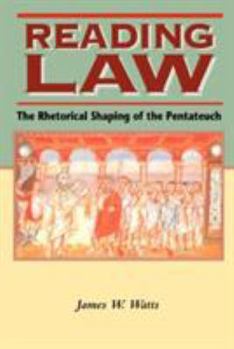Reading Law
Watts here argues that conventions of oral rhetoric were adapted to shape the literary form and contents of the Pentateuch. The large-scale structure-stories introducing lists of laws that conclude with divine sanctions-reproduces a common ancient strategy for persuasion. The laws' use of direct address, historical motivations and frequent repetitions serve rhetorical ends, and even the legal contradictions seem designed to appeal to competing constituencies. The instructional speeches of God and Moses reinforce the persuasive appeal by characterizing God as a just ruler and Moses as a faithful scribe. The Pentateuch was designed to persuade Persian-period Judaeans that this Torah should define their identity as Israel.
Format:Paperback
Language:English
ISBN:1850759979
ISBN13:9781850759973
Release Date:June 1999
Publisher:Sheffield Academic Press
Length:192 Pages
Weight:0.65 lbs.
Dimensions:0.4" x 6.1" x 9.2"
Customer Reviews
0 rating





